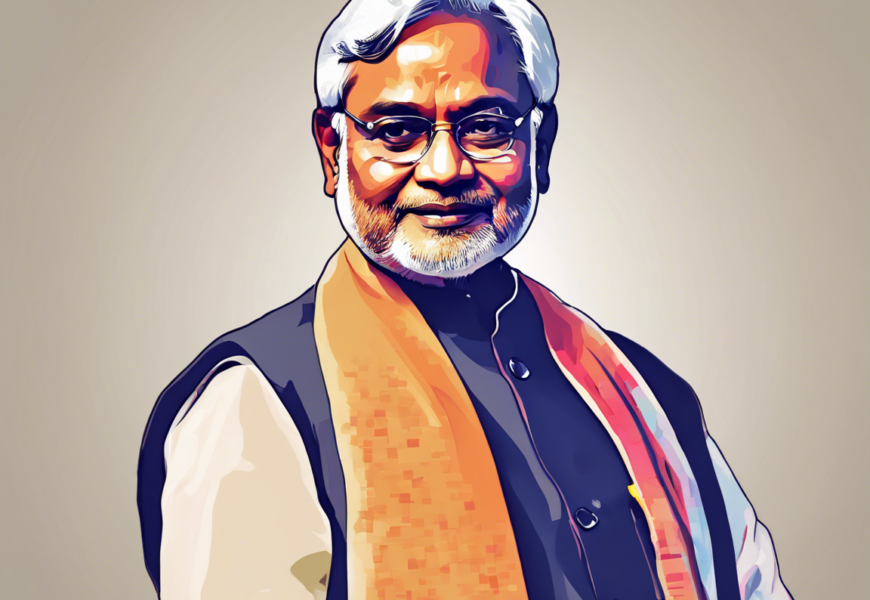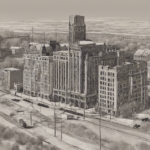Nitish Kumar, a prominent Indian politician, has had a remarkable political journey in the state of Bihar. Born on March 1, 1951, in Bakhtiarpur, Bihar, Nitish Kumar has been a key figure in Bihar politics for decades. His political career has been characterized by various ups and downs, alliances and breakups, and a focus on development and governance. In this article, we will delve into the political journey of Nitish Kumar in Bihar, exploring the major milestones, challenges, and achievements that have defined his career.
Early Political Career
Nitish Kumar’s entry into politics can be traced back to his association with the Jayaprakash Narayan-led movement against the Indira Gandhi government in the 1970s. This movement, also known as the JP movement, was a significant turning point in Nitish Kumar’s political career. He joined the socialist group within the Janata Party and quickly rose through the ranks.
In 1985, Nitish Kumar was first elected to the Bihar Legislative Assembly from the Harnaut constituency. Over the years, he held various ministerial positions in the state government, showcasing his administrative skills and commitment to public service. His clean image and focus on development endeared him to the people of Bihar, setting the stage for his future political journey.
Chief Minister of Bihar
Nitish Kumar’s most significant milestone came in 2005 when he was sworn in as the Chief Minister of Bihar. This marked the beginning of a new era in Bihar politics, characterized by a focus on good governance, development initiatives, and social justice. Nitish Kumar’s tenure as Chief Minister saw a renewed emphasis on infrastructure development, education, healthcare, and law and order.
Under his leadership, Bihar witnessed significant improvements in key indicators such as roads, electricity, and social welfare programs. The government’s efforts to improve law and order in the state were particularly noteworthy, leading to a decline in crime rates and the restoration of confidence among the people.
Alliance Politics and Breakups
Nitish Kumar’s political journey has been marked by strategic alliances and occasional breakups with key political parties. One of the most notable alliances was with the Bharatiya Janata Party (BJP), which began in 1996 and endured several ups and downs over the years. The Nitish Kumar-led JD(U)-BJP alliance tasted success in the 2005 and 2010 Bihar Assembly elections, forming a stable government in the state.
However, in 2013, Nitish Kumar decided to part ways with the BJP over ideological differences, particularly on the issue of Narendra Modi’s candidacy for the Prime Minister’s post. This move led to a realignment of political forces in Bihar, with Nitish Kumar forming a new alliance with the Congress party and the Rashtriya Janata Dal (RJD). This alliance emerged victorious in the 2015 Bihar Assembly elections, with Nitish Kumar once again assuming the role of Chief Minister.
In 2017, there was another twist in the tale when Nitish Kumar switched sides yet again, rejoining forces with the BJP and assuming the position of Chief Minister. This move was met with mixed reactions, with some praising Nitish Kumar for prioritizing governance over politics, while others criticized him for his perceived opportunism.
Achievements and Challenges
Nitish Kumar’s tenure as Chief Minister has been marked by both commendable achievements and daunting challenges. Some of the key achievements of his government include:
- Improvements in law and order: Nitish Kumar’s focus on maintaining law and order in Bihar has yielded positive results, making the state safer for its residents.
- Infrastructure development: The government has invested heavily in building roads, bridges, and other infrastructure, improving connectivity and spurring economic growth.
- Social welfare programs: Nitish Kumar has launched several social welfare schemes aimed at uplifting marginalized communities and improving living standards.
However, Nitish Kumar’s government has also faced criticism on various fronts. Issues such as unemployment, corruption, and inadequate healthcare facilities continue to plague the state, underscoring the need for sustained efforts to address these challenges.
Future Prospects
As Nitish Kumar continues on his political journey, the road ahead is likely to be fraught with challenges and opportunities. The upcoming Bihar Assembly elections in 2020 will test his political acumen and popularity, with the opposition gearing up to pose a tough challenge.
Nitish Kumar’s ability to navigate the complex terrain of Bihar politics, forge strategic alliances, and deliver on his promises will determine his political legacy in the years to come. Whether he can transcend the highs and lows of alliance politics and focus on his vision for Bihar’s development remains to be seen.
Frequently Asked Questions (FAQs)
1. What are some of Nitish Kumar’s major achievements as Chief Minister of Bihar?
Nitish Kumar’s major achievements include improvements in law and order, infrastructure development, and the implementation of social welfare programs aimed at uplifting marginalized communities.
2. What led to Nitish Kumar’s breakup with the BJP in 2013?
Nitish Kumar parted ways with the BJP in 2013 over ideological differences, particularly on the issue of Narendra Modi’s candidacy for the Prime Minister’s post.
3. How has Nitish Kumar’s realignment with the BJP in 2017 impacted Bihar politics?
Nitish Kumar’s realignment with the BJP in 2017 led to a shift in political dynamics in Bihar, with his government focusing on governance while facing criticism for perceived opportunism.
4. What are some of the challenges faced by Nitish Kumar’s government in Bihar?
Challenges include issues such as unemployment, corruption, and inadequate healthcare facilities, which continue to pose significant hurdles to the state’s development.
5. What is the significance of the upcoming Bihar Assembly elections for Nitish Kumar’s political future?
The upcoming Bihar Assembly elections in 2020 will be crucial for Nitish Kumar’s political future, testing his popularity and leadership as he aims to secure another term as Chief Minister.




